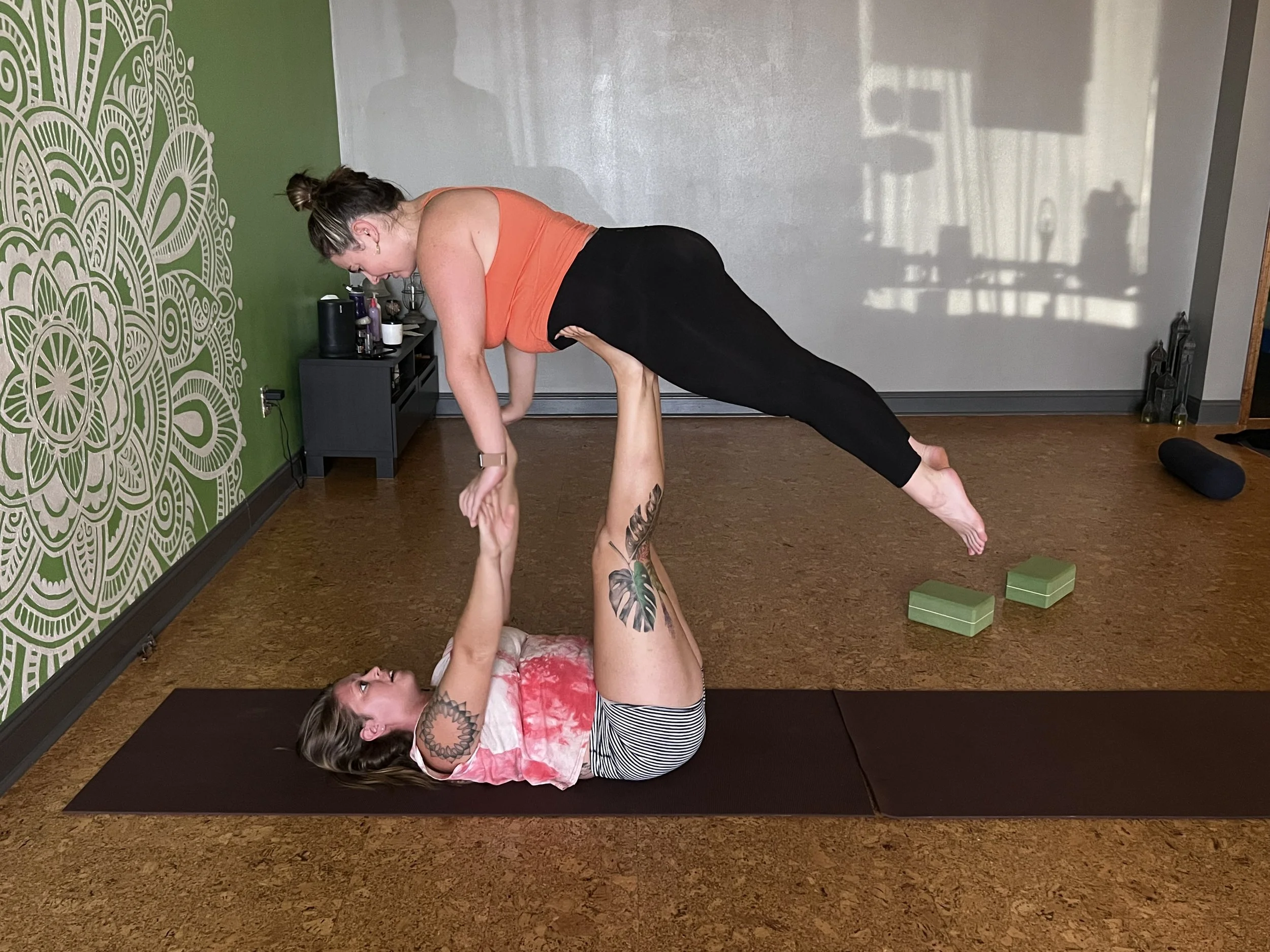HOLISTIC THERAPY: ADDING JOYFUL MOVEMENT FOR YOUR MENTAL HEALTH
Aubrey Richardson LPC (owner & therapist at Sage Holistic Counseling) integrates joyful movement through hot yoga! This picture was an exercise in partner yoga
The Remarkable Benefits of Exercise for Your Mental Health
In a fast-paced world filled with countless responsibilities and stressors, taking care of our mental health is more important than ever. While we often hear about the physical benefits of exercise, such as cardiovascular health, its impact on mental well-being should not be overlooked.
Exercise has been shown to have a profound effect on mental health, with numerous studies highlighting its positive impact on mood, stress levels, and overall psychological well-being. Regardless of the specific activity, engaging in regular physical activity can work wonders for your mind. Here are some of the key ways in which exercise can benefit your mental health:
1. Boosts Mood: One of the most well-known benefits of exercise is its ability to boost mood. Physical activity stimulates the production of endorphins, often referred to as "feel-good" or “happy people don’t kill their husband” hormones, which can help reduce feelings of sadness, anxiety, and stress. Regular exercise has been linked to lower rates of depression and anxiety, and can be an effective tool in managing mood disorders like bipolar spectrum disorders.
2. Reduces Stress: Exercise is a natural stress reliever. When you engage in physical activity, your body releases tension and relaxes, leading to a decrease in stress levels. Higher intensity exercises help the brain naturally close the fight-or-flight (stress) cycle in our modern world. Additionally, exercise can help you develop resilience to stress over time, making it easier to cope with life's challenges.
3. Improves Sleep: Quality sleep is essential for good mental health, and exercise can play a significant role in improving sleep patterns. Regular physical activity can help you fall asleep faster, deepen your sleep, and wake up feeling more refreshed and alert. However, this may be the most true of morning or afternoon exercisers.
4. Enhances Self-Efficacy: Regular exercise can boost your self-esteem and confidence. As you set and achieve goals, you'll experience a sense of accomplishment that can spill over into other areas of your life, leading to improved self-worth and a more positive self-image.
5. Increases Brain Health: Exercise has been shown to have a positive impact on brain health and cognitive function. It can improve memory, attention span, and overall cognitive abilities, helping you stay sharp and focused as you age. Students who regularly engage in aerobic exercise perform better on their exams!
6. Increases Serotonin Receptors: Exercising can actually change your brain structure for the better! Studies suggest that regular exercise creates more receptors for serotonin, which means that more can be absorbed and you feel the benefits of improved mood and sleep.
7. Creates Opportunities for Social Support: If you choose to engage in group fitness or workout with a friend, you are creating more opportunities to create or strengthen friendships. Social support is a known protective factor in all mental health disorders.
8. Spending Time Outdoors: Exercises outdoors creates opportunities to enjoy the sunshine, as long as you wear SPF and stay properly hydrated! Regular sunlight exposure improved mood and can boost immunity.
The Importance of Exercise for Healthcare Professionals, Perfectionists, People Pleasers, and Overachievers
Healthcare professionals, perfectionists, people pleasers, and overachievers often face unique mental health challenges due to the high demands and stress associated with their roles and personality traits. Incorporating regular exercise into their routines can offer significant mental health benefits tailored to their specific needs.
Healthcare Professionals
Healthcare professionals are often on the front lines, dealing with high-stress situations and long hours. This constant pressure can lead to burnout, compassion fatigue, and emotional exhaustion. Regular exercise can serve as an essential tool for managing stress, improving mood, and enhancing overall well-being. It can also help healthcare professionals maintain their physical health, which is crucial for sustaining the energy and resilience needed to care for others.
Perfectionists
Perfectionists tend to set incredibly high standards for themselves and may experience intense self-criticism when they perceive they fall short. This can lead to chronic stress, anxiety, and even depression. Exercise provides a healthy outlet for releasing built-up tension and can serve as a reminder that progress, not perfection, is the goal. Engaging in physical activity can also foster a sense of accomplishment and self-compassion, helping perfectionists develop a healthier relationship with themselves.
People Pleasers
People pleasers often prioritize others' needs over their own, leading to neglect of self-care and personal well-being. This can result in burnout, resentment, and decreased self-esteem. Regular exercise can be an act of self-care that prioritizes their health and well-being. It also helps in setting boundaries, as taking time for physical activity can reinforce the importance of self-prioritization and balance in relationships.
Overachievers
Overachievers are driven by the desire to succeed and often take on more than they can handle. This relentless pursuit of achievement can lead to stress, anxiety, and burnout. Exercise can provide a much-needed break from their demanding schedules, allowing them to recharge both physically and mentally. It also promotes better focus and productivity, making it easier to manage their responsibilities effectively.
Conclusion
The benefits of exercise for mental health are extensive and impactful, particularly for those in high-stress roles or with tendencies toward perfectionism, people-pleasing, and overachievement. By incorporating regular physical activity into their routines, individuals can improve their mood, reduce stress, enhance self-esteem, and maintain better overall mental health. Whether you are a healthcare professional, a perfectionist, a people pleaser, or an overachiever, prioritizing exercise can be a transformative step toward a healthier and more balanced life.
